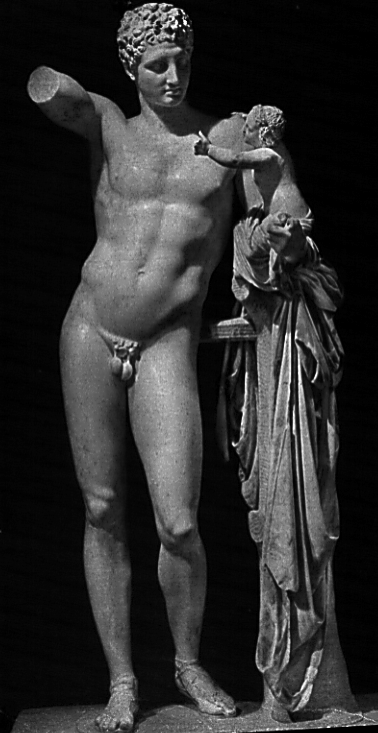 |
HERMES(Some Notes) |  | |||
-H. J. Rose, A Handbook of Greek Mythology p. 146.
"...We must not forget the possibility that the Arcadians found [HERMES] in Arcadia when they arrived there, and that his name is not Greek at all. Certain it is that he was often worshipped under the form of a mere stone [herma]..."
-A. Boisacq, Dictionnaire étymologique de la langue grecque:
"..the etymology of Hermes is unknown..."
-Martin P. Nilsson, History of Greek Religion p. 109:
"The name is one of the few that are etymologically transparent and means "he of the stone-heap" ."
HERMES, son of Zeus and Maia, was born in a cave on Mount Cyllene in ARCADIA.
`SLAYER OF ARGUS' (in Hesiod's Theogony)
When Zeus was sleeping with Io and Hera became aware of it, Zeus changed himself and Io into cattle. Pretending that Io was only a heifer, Zeus could not refuse giving it to Hera when she asked. Hera assigned Argus Panoptes (‘Argus-with-eyes-all-over‘) to watch Io. HERMES lulled Argus to sleep and killed him. Thereupon Hera sent the gadfly to torment Io, who was driven mad. Argus' eyes (according to that romantic Roman mythological pervert, Ovid (Metamorphoses I. 722) were put by Hera into the tails of her favorite peacocks.
- Hermes a god of culture: music (He invented the lyre, from the shell of a tortoise); patron of young men, as a god of the gymnasium (each of which contained a HERMAEUM)
- HERMES THE SHEPHERD appointed by his half-brother Apollo, after the theft and return of Apollo's sacred cattleherd (from Pieria in Macedonia). Apollo also gave Hermes some prophetic gifts as well.
- HERMES THE THIEF (of Apollo's cattle) The Homeric Hymn to Hermes [text in Morford and Lenardon] also the thief of Apollo's quiver and arrows.
- HERMES, THE PATRON OF MERCHANTS (whom the Greeks would have thought of as travelers, liars and thieves) [See Aristotle's Politics]
-
HERMES PSYCHOPOMPOS (psyche ‘shade’ pompos ‘guide’) conducts the souls of the deceased from their bodies to the shores of the River Styx (in the Underworld) where he hands them over to the Ferryman CHARON. Hermes carries a staff with snakes wound about it as his symbol, the CADUCEUS (nowadays seen mostly on double-parked Mercedes convertibles belonging to doctors).
MAGNES, the shepherd, who kept and later suffered the loss of Apollo's sacred herd of cattle, had a son named HYMENAEUS (Hymenaios), with whom Apollo was in love. Since Apollo hung around Magnes' house all the time to be with Hymenaeus, Hermes was able to make the shepherd Magnes go to sleep so that the cattle could be robbed.BATTOS, an old vineyard caretaker, witnessed the theft and had the knowledge of the thief's identity and modus operandi. He was bribed with the gift of one of the cows (receiving stolen property) to keep his mouth shut. After Hermes' adventure with the cattle was over and he and Apollo had patched things up, Hermes returned to Pieria and visited Battos (in disguise). Battos blabbed the whole story, and was turned into a stone (a herm ?). [Is this an aetiological tale? or (considering that Battos means `blabbermouth') is it an etymological tale? or is it both?]
© J. P. ADAMS